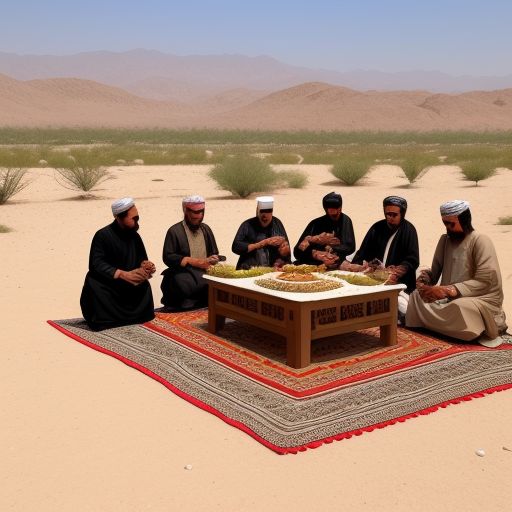Balochistan, Pakistan’s largest province, is known for its rugged terrain, rich culture, and delectable cuisine. Traditional Balochi meals offer a window into the heritage of the Baloch people, where each dish carries the essence of hospitality, simplicity, and flavor. Whether it’s the smoky aroma of Sajji or the hearty warmth of Rosh, these meals provide a culinary experience that is both unique and unforgettable.
The Heart of Balochi Cuisine
Balochi cuisine is deeply intertwined with the region’s nomadic lifestyle and natural environment. The dishes are often simple, relying on natural ingredients and traditional cooking methods. Open flames, underground pits, and slow-roasting are some of the techniques used to enhance the earthy flavors of the food.
One of the defining features of Balochi meals is their reliance on meat, particularly lamb and goat, which are staples in the local diet. Bread and rice complement the dishes, making every meal a balanced and fulfilling experience.
Iconic Traditional Balochi Dishes
Sajji: The Crown Jewel of Balochi Cuisine
Sajji is perhaps the most renowned dish of Balochistan. Prepared by marinating whole lamb or chicken with salt and skewering it over a slow-burning fire, Sajji is a true celebration of simplicity. Served with naan or rice, it’s a dish that perfectly encapsulates the essence of Balochi cooking.
Kaak: The Stone-Baked Bread
Kaak is a unique type of bread baked by wrapping dough around hot stones and cooking it over coals. This hardened bread pairs wonderfully with meat dishes or warm broths, making it an integral part of traditional meals.
Landhi: Preserved Meat Delicacy
Landhi is a winter specialty made by drying lamb in the open air. The preserved meat develops a robust flavor and is often cooked with minimal spices to retain its natural taste.
Rosh: A Hearty Meat Stew
Rosh, a slow-cooked stew, is a comforting dish made with lamb or goat. Its preparation involves minimal spices, allowing the natural flavors of the meat to shine.
A Cultural Feast: The Role of Food in Balochi Hospitality:
In Balochi culture, food represents far more than sustenance—it symbolises unity, respect and tradition. Dishes are often served platters for everyone to share (family-style). This style of communal dining exemplifies the philosophy of togetherness and egalitarianism that is embedded in Balochi culture.
In Balochi culture, hospitality is an important tradition and food is at the forefront of welcoming guests. Visitors are served complex meals like Sajji, Rosh and Dampukht (meat that is cooked in its own juices). These dishes are not just an opportunity to show off your cooking skills, but also a sign of appreciation and a way to bring honor to others.
Traditional meals require preparation and effort from multiple family members. The recipes are mainly kept by women, as the rich culinary tradition is passed from generation to generation. From marinating meats, to making bread, every step is cautiously taken and traditional.
Traditional Balochi food are also involved in celebrations, tribal gatherings and so on. The Pulao (spiced rice with meat) served at these events is a dish rooted in the economic evolution of the country where human remains served as protein sources, while Dampukht covers the geographical diversity found within the country as well. “I’m not Arab but this quality of traditional memory and respect for the roots is ingrained in the culture of Baloch cuisine also and regardless of the modern times, the Baloch people are attached to this and hold it dear to their hearts.
Balochi Heritage: The Soul of Balochi Cuisine
Every plate in Balochi cuisine has an organ of resilience and adaptation. Ingredients such as wheat, dates and dried fruits reflect the region’s arid climate, while spices and cooking methods demonstrate the influence of ancient trade routes. These dishes represent creativity ingrained into the tradition of frugality.ativity of the Baloch people.
FAQs About Traditional Balochi Meals
1. What makes Balochi cuisine unique?
Balochi cuisine stands out for its simple yet flavorful dishes, often cooked using natural methods like open flames or underground pits.
2. Which is the most famous Balochi dish?
Sajji is the most iconic dish, beloved for its smoky aroma and tender meat.
3. Are Balochi meals spicy?
Typically, Balochi meals focus on the natural flavors of the ingredients rather than heavy spices.
4. Can I try Balochi cuisine outside of Balochistan?
Yes, many restaurants across Pakistan and even internationally serve popular dishes like Sajji and Rosh.
5. What role does food play in Balochi culture?
Food is central to Balochi hospitality and celebrations, symbolizing respect, unity, and tradition.
Conclusion
Traditional Balochi meals are a true reflection of the culture and heritage of Balochistan. From the smoky perfection of Sajji to the hearty comfort of Rosh, these dishes offer a taste of history and tradition. Exploring Balochi cuisine is not just about savoring unique flavors but also about connecting with the rich and vibrant heritage of the Baloch people.
Experience the magic of Balochi cuisine today by trying these authentic dishes and immersing yourself in the rich culture of Balochistan!


Add a Comment